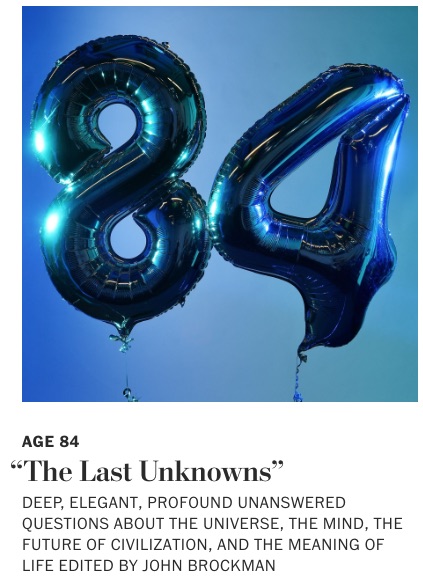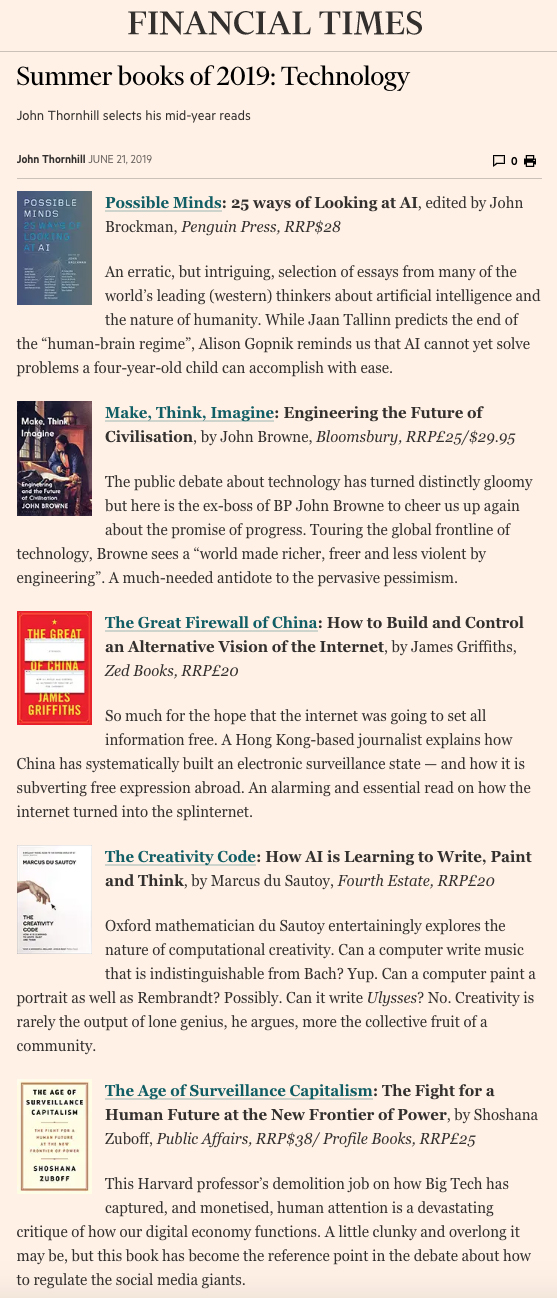Daniel C. Dennett: The De-Darwinizing of Cultural Change (HeadCon '13 Part X)
|
[Video designed for full screen viewing. Click icon
Think for a moment about a termite colony or an ant colony—amazingly competent in many ways, we can do all sorts of things, treat the whole entity as a sort of cognitive agent and it accomplishes all sorts of quite impressive behavior. But if I ask you, "What is it like to be a termite colony?" most people would say, "It's not like anything." Well, now let's look at a brain, let's look at a human brain—100 billion neurons, roughly speaking, and each one of them is dumber than a termite and they're all sort of semi-independent. If you stop and think about it, they're all direct descendants of free-swimming unicellular organisms that fended for themselves for a billion years on their own. There's a lot of competence, a lot of can-do in their background, in their ancestry. Now they're trapped in the skull and they may well have agendas of their own; they have competences of their own, no two are alike. Now the question is, how is a brain inside a head any more integrated, any more capable of there being something that it's like to be that than a termite colony? What can we do with our brains that the termite colony couldn't do or maybe that many animals couldn't do? It seems to me that we do actually know some of the answer, and it has to do with mainly what Fiery Cushman was talking about—it's the importance of the cultural niche and the cognitive niche, and in particular I would say you couldn't have the cognitive niche without the cultural niche because it depends on the cultural niche. [Continue to "THE DE-DARWINIZING OF CULTURAL CHANGE"] Daniel C. Dennett is a Philosopher; Austin B. Fletcher Professor of Philosophy, Co-Director, Center for Cognitive Studies, Tufts University; Author, Intuition Pumps.
Read the rest of the conversation from HeadCon '13: WHAT'S NEW IN SOCIAL SCIENCE?
|

Latest News

The cultural entrepreneur, John Brockman, has brought together the 25 most important scientific minds to discern artificial intelligence. His reflections are reflected in the book "Possible minds: 25 ways of looking at AI".
This book gathers the inspiration of the mathematician-philosopher Norbert Wiener who wrote about the place of machines in society that ended with a warning: "We will never receive the right answers to our questions unless we ask the right questions ... The time is too late ... , and the choice of good and evil knocks on our door ”.
Among the participants in Brockman's new book is an interesting essay by Harvard College professor Steven Pinker, under the title "Tech prophecy and the underappreciated causal power of ideas" (Technological prophecy and underestimated causal power of ideas). . . .

. . . Current algorithms generally work best when they look at a set number of circumstances and make predictions from those variables. That’s why AI can be good at chess or even the board game Go! In fact, this ability for AI to work within the confines of a specific problem set is what allows it to work very quickly to resolve a specific problem.
In John Brockman’s Possible Minds: 25 Ways of Looking at AI, David Deutsch observes that “a mere AI is incapable of having any such ideas, because the capacity for considering them has been designed out of its constitution.” AI is not creative and has a hard time predicting the unknown. This is a big problem in regard to predicting violent actions. . . .

. . .That Explains Everything: Beautiful, Profound and Elegant Ideas About How the World Works, edited by John Brockman . . . a well-known cultural dynamizer whose trajectory has taken place in the world of New York avant-garde art, science, publishing, software and the Internet . . . the founder and editor of Edge.org, a website dedicated to scientific discussions in which the world's most brilliant thinkers participate, of what he has called the "Third Culture".
It is no exaggeration to say that each page gives us a surprise, about animals, planets, diseases, the limits of rationality, about the idea of beauty, the different ways of facing reality (empiricism and rationalism), optical illusions, snowflakes, lemons, cats, turtles, birds, frogs . . . and in this book there is everything as in apothecary.

Picking up C. P. Snow's glove in his famous lecture on the two cultures, the scientific and the humanistic, John Brockman founded three decades ago EDGE, a modern Bloomsbury Circle in which high personalities swarm and that every year asks a question. The one we are dealing with here asks about "the most beautiful, profound or elegant explanation" and is answered by, among others, psychiatrist Judith Rich Harris, neuroscientist David Eagleman, physicist Carlo Rovelli, anthropologist Helen Fisher, philosopher Daniel Dennett, archaeologist Christine Finn and even musician Brian Eno, in an anthology entitled That Explains It All (Deusto). There are, of course, very diverse answers: natural selection, magnetism, entropy, germs, the principle of uncertainty... The result is an attempt at natural philosophy in which the apparent border between sciences and humanities seems to be blurred. Is it that this never existed?

John Brockman, writer and editor, created a website called Edge (edge, or boundary) in which a conversation takes place between the academic world and an intellectually curious audience. That page was classified in the same category as magazines such as The New Yorker and The Economist. Brockman considered himself heir to the artist J. L. Byars, who last century organized a club of very diverse thinkers and said that to reach the edge of knowledge one had to ask others the questions they ask themselves.
Discussions in Edge could be collected today in a manuscript of more than ten million words. One of his initiatives was the annual publication of a book with various answers to a great question he asked. This year, to celebrate twenty years of the initiative (and to close it), Brockman decided not to ask a question, but to ask each participant for his, that last unknown that won't let him sleep. The book has more than 300 pages; each has only a brief question printed and the name of the one who asks it. Natural and social scientists, writers, artists and entrepreneurs participated.
Here are our picks for worthwhile books to read during each year of life, from 1 to 100, along with some of the age-appropriate wisdom they impart.

With time and wisdom to spare, there may be no better moment to ponder life’s big mysteries.
"An erratic, but intriguing, selection of essays from many of the world’s leading (western) thinkers about artificial intelligence and the nature of humanity."

. . . 4. John Brockman, editor, The Last Unknowns: Deep, Elegant, Profound UNANSWERED QUESTIONS About the Universe, the Mind, the Future of Civilization, and the Meaning of Life. My nominated question was: “How far are we from wishing to return to the technologies of the year 1900?” NB: you get only the questions, not the answers. . . .

What is elegance for scientists? This is the kind of question that John Brockman, one of the most unique editors of our time, and also a sort of cultural animator of the scientific elite, asks his pupils once a year for the online magazine Edge.org. He is inspired by cutting-edge intellectual societies such as the Algonquin Roundtable and the Bloomsbury Group. A few years ago, he asked all those brains, "What's your favorite beautiful, deep, or elegant explanation?" There was an avalanche of responses, and Deusto has just published them in Spanish. . . .
My favourite physicist, Frank Wilczek, believes that simplicity leads to depth, elegance and beauty, adding: "There are few processes as elegant as building a baby following the DNA program."

George Bernard Shaw once said, “There are those that look at things the way they are, and ask why? I dream of things that never were, and ask why not.” At the essence of Shaw’s quote lies the notion that questions matter. However, not all questions are created equal and in order to extract the most usefulness from it, the right question needs to be formulated. It’s a case of lock and key. The right question opens doors and allows people to explore what was once stowed away. The Last Unknowns (William Morrow) is a veritable treasure trove of these type of questions. . . .
The Last Unknowns is a loosely organized compendium of queries. One page, one question. Without any guidance, the topics meander but like a flâneur on the streets of Paris, aimlessly wandering but with the solitary purpose of discovery. They run the thematic gamut. . . .
So does The Last Unknowns provide any answers? Not in a single instance. That isn’t what the book was designed to accomplish. Does it get the mental wheels turning in directions they may never have done before? Absolutely. . . .




